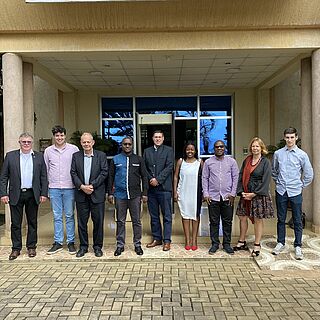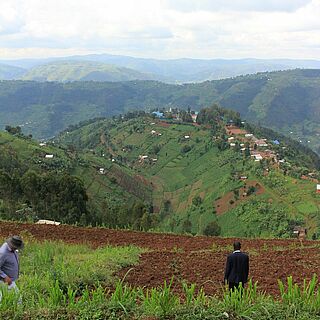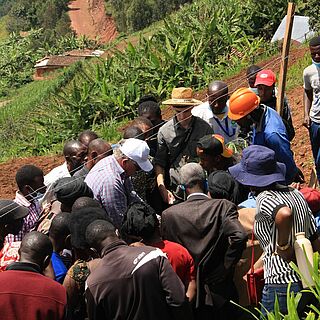Tropical viticulture in Rwanda - endurance test for fungus-resistant grape varieties
The partnership between Rhineland-Palatinate and Rwanda is celebrating its 40th anniversary this year. The transfer of knowledge between the two countries is also to be expanded in the field of viticulture. Prof. Dr. Dominik Durner from Wine Campus Neustadt has offered his support for the cultivation of grapes in the "land of a thousand hills" in cooperation with the Rhineland-Palatinate Ministry of Agriculture.
In May 2022, a delegation from Rhineland-Palatinate traveled to Rwanda for this reason. Two students from Wine Campus Neustadt were also part of the delegation. The delegation visited three farms with representatives of the Rwandan Ministry of Agriculture and the Rwanda Agriculture Board (RAB), where farm training was offered to local farmers. The aim was to impart know-how on cultivating vines, dealing with pests and fungal diseases and traditional trellis training.
At the beginning of the trip, the project group from Germany handed over the certified grape varieties "Muskat bleu" and "Birstaler Muskat" to the RAB Institute. These fungus-resistant grape varieties (PIWIs) are designed to withstand the tropical conditions. The experience gained in Rwanda with the new grape varieties may also provide valuable insights for the handling of PIWIs in German wine-growing regions.
The trip concluded with a visit to a farm in Rulindo. A new vineyard of around 4 hectares is to be built in a newly designed vineyard at an altitude of 2200 meters. In the presence of viticulture experts, the first row of vines was planted in the form of a trellis system. The new technique was received with great interest by the Rwandan farmers. However, the older vines on the farm, which generally thrive well in the tropical climate, were damaged by severe fungal infestation and numerous cases of erosion threatened the cultivated areas. Prof. Dr. Jochen Bogs from Wine Campus Neustadt speaks of a "unique opportunity" to investigate the use of PIWIs under extreme conditions in Rwanda. Thanks to the expertise of the specialists who traveled with them, approaches for improving the situation on the ground could be found.




